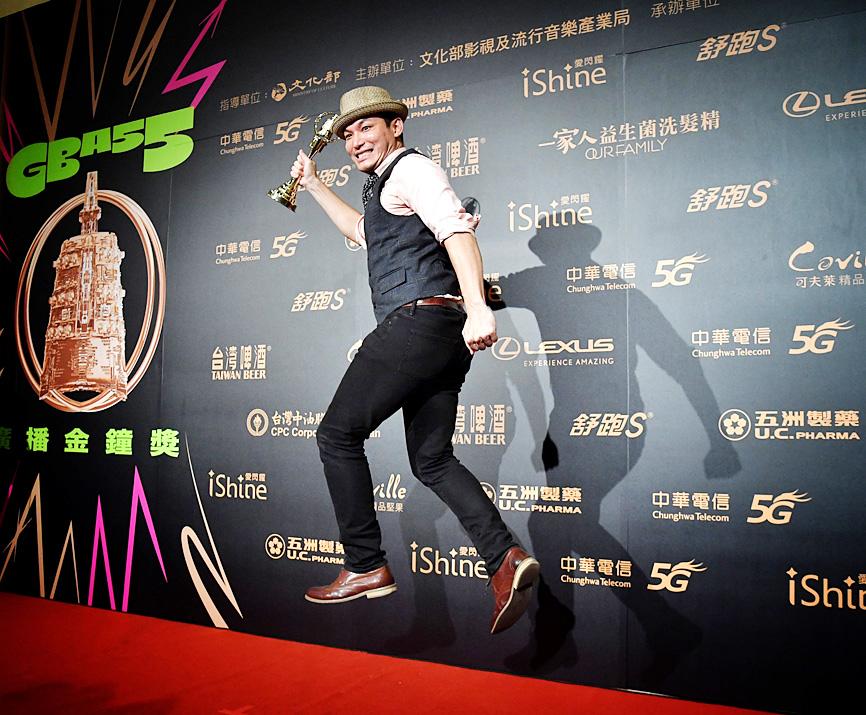A performance video featuring jazz bassist Vincent Hsu (徐崇育) and his ensemble, Soy La Ley Afro-Cuban Jazz Band, premiered on Facebook on Friday.
The performance was the result of a collaboration between the Taipei Economic and Cultural Representative Office in New York and the Rhode Island-based organizer FirstWorks.
The video is to be available on the FirstWorks Web site (http://first-works.org/events/vincent-hsu-soy-la-ley-afro-cuban-band) until Friday.

Photo: CNA
The performance, titled “Jazz Changed, Jazz Changes, Jazz Changin’,” aims to show that jazz is alive and well beyond its birthplace, and as suggested by the title, shows how the genre is always evolving, the organizer said.
The video also features interviews with prominent musicians and academics, including Hsu’s mentor, bassist Cecil McBee, historian Loren Schoenberg, drummer and educator Jerome Jennings, and poet and writer Naomi Extra.
“Jazz is one of the ultimate fashions of expressing oneself, especially because it is spontaneous. No wonder the world at large loves this music, because it never repeats itself,” McBee said.
The video was shot in four locations: Tianhou Temple (天后宮) in Changhua County’s Lukang Township (鹿港), the Jianguo Market in New Taipei City’s Sindian District (新店), the Museum of Old Taiwan Tiles in Chiayi County and the Lavender Cottage tourist area in Taichung.
The music changes and shifts in each location, becoming attuned to the local area while maintaining the essence of jazz, organizers said.
“I think the definition of jazz is the tradition, and the tradition is whatever it is you. The second thing is contemporary times and contemporary culture. And you add those two things, and you get what I think is jazz of 2020,” Schoenberg has said.
Hsu has been heavily influenced by New York’s Spanish Harlem, where he launched his music career, and his music brings together elements of New York jazz, Latin music, African polyrhythms and Taiwanese composition.
During a tour in 2019, Hsu told reporters that an Asian man playing jazz in the US was similar to a foreigner performing in gezai opera in Taiwan.

Beijing could eventually see a full amphibious invasion of Taiwan as the only "prudent" way to bring about unification, the US Department of Defense said in a newly released annual report to Congress. The Pentagon's "Annual Report to Congress: Military and Security Developments Involving the People's Republic of China 2025," was in many ways similar to last year’s report but reorganized the analysis of the options China has to take over Taiwan. Generally, according to the report, Chinese leaders view the People's Liberation Army's (PLA) capabilities for a Taiwan campaign as improving, but they remain uncertain about its readiness to successfully seize

Taiwan is getting a day off on Christmas for the first time in 25 years. The change comes after opposition parties passed a law earlier this year to add or restore five public holidays, including Constitution Day, which falls on today, Dec. 25. The day marks the 1947 adoption of the constitution of the Republic of China, as the government in Taipei is formally known. Back then the Chinese Nationalist Party (KMT) governed China from Nanjing. When the KMT, now an opposition party in Taiwan, passed the legislation on holidays, it said that they would help “commemorate the history of national development.” That

Taiwan has overtaken South Korea this year in per capita income for the first time in 23 years, IMF data showed. Per capita income is a nation’s GDP divided by the total population, used to compare average wealth levels across countries. Taiwan also beat Japan this year on per capita income, after surpassing it for the first time last year, US magazine Newsweek reported yesterday. Across Asia, Taiwan ranked fourth for per capita income at US$37,827 this year due to sustained economic growth, the report said. In the top three spots were Singapore, Macau and Hong Kong, it said. South

Snow fell on Yushan (Jade Mountain, 玉山) yesterday morning as a continental cold air mass sent temperatures below freezing on Taiwan’s tallest peak, the Central Weather Administration (CWA) said. Snowflakes were seen on Yushan’s north peak from 6:28am to 6:38am, but they did not fully cover the ground and no accumulation was recorded, the CWA said. As of 7:42am, the lowest temperature recorded across Taiwan was minus-5.5°C at Yushan’s Fengkou observatory and minus-4.7°C at the Yushan observatory, CWA data showed. On Hehuanshan (合歡山) in Nantou County, a low of 1.3°C was recorded at 6:39pm, when ice pellets fell at Songsyue Lodge (松雪樓), a